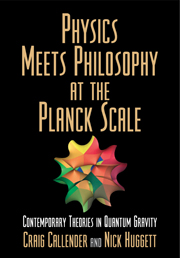Book contents
- Frontmatter
- Contents
- Preface
- 1 Introduction
- Part I Theories of Quantum Gravity and their Philosophical Dimensions
- Part II Strings
- Part III Topological Quantum Field Theory
- Part IV Quantum Gravity and the Interpretation of General Relativity
- 9 On general covariance and best matching
- 10 Pre-Socratic quantum gravity
- 11 The origin of the spacetime metric: Bell's ‘Lorentzian pedagogy’ and its significance in general relativity
- Part V Quantum Gravity and the Interpretation of Quantum Mechanics
- References
- Notes on contributors
- Index
10 - Pre-Socratic quantum gravity
Published online by Cambridge University Press: 15 December 2009
- Frontmatter
- Contents
- Preface
- 1 Introduction
- Part I Theories of Quantum Gravity and their Philosophical Dimensions
- Part II Strings
- Part III Topological Quantum Field Theory
- Part IV Quantum Gravity and the Interpretation of General Relativity
- 9 On general covariance and best matching
- 10 Pre-Socratic quantum gravity
- 11 The origin of the spacetime metric: Bell's ‘Lorentzian pedagogy’ and its significance in general relativity
- Part V Quantum Gravity and the Interpretation of Quantum Mechanics
- References
- Notes on contributors
- Index
Summary
Introduction
Physicists who work on canonical quantum gravity will sometimes remark that the general covariance of general relativity is responsible for many of the thorniest technical and conceptual problems in their field. In particular, it is sometimes alleged that one can trace to this single source a variety of deep puzzles about the nature of time in quantum gravity, deep disagreements surrounding the notion of ‘observable’ in classical and quantum gravity, and deep questions about the nature of the existence of spacetime in general relativity.
Philosophers who think about these things are sometimes sceptical about such claims. We have all learned that Kretschmann was quite correct to urge against Einstein that the ‘General Theory of Relativity’ was no such thing, since any theory could be cast in a generally covariant form, and hence that the general covariance of general relativity could not have any physical content, let alone bear the kind of weight that Einstein expected it to. Friedman's assessment is widely accepted: ‘As Kretschmann first pointed out in 1917, the principle of general covariance has no physical content whatever: it specifies no particular physical theory; rather, it merely expresses our commitment to a certain style of formulating physical theories’ (Friedman 1983, p. 44). Such considerations suggest that general covariance, as a technically crucial but physically contentless feature of general relativity, simply cannot be the source of any significant conceptual or physical problems.
- Type
- Chapter
- Information
- Physics Meets Philosophy at the Planck ScaleContemporary Theories in Quantum Gravity, pp. 213 - 255Publisher: Cambridge University PressPrint publication year: 2001
- 29
- Cited by

